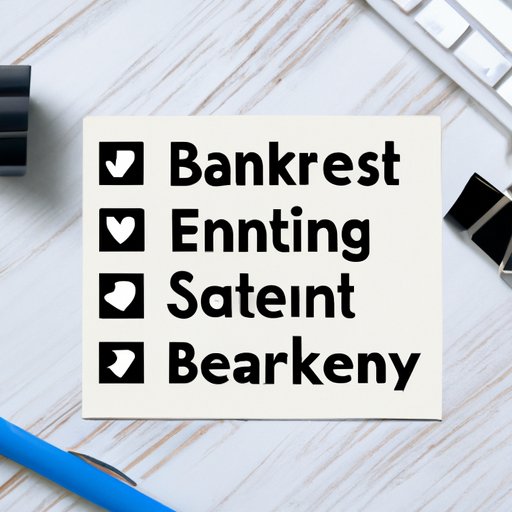
Introduction
As a small business owner, choosing the right bank for your business is crucial. Your bank will provide you with the financial tools and services necessary to run your business, and a good banking relationship can help you achieve your goals. However, not all banks are created equal, and finding the right one can be overwhelming. In this article, we will explore the essential features that you need to consider when choosing a bank for your small business, how to pick the right bank account, and what to expect from your business bank.

7 Essential Features to Consider When Choosing a Bank for Your Small Business
When evaluating potential banks, there are seven essential features that you need to consider. These features will help you find a bank that meets your specific needs.
1. Customer service
Good customer service is essential, especially when it comes to financial matters. Your bank should have knowledgeable staff who can answer your questions and provide you with timely assistance when needed. A bank with poor customer service can cause frustration, delays, and even financial losses for your business.
2. Account fees
Banks charge a variety of fees, such as monthly maintenance fees, transaction fees, and overdraft fees. You should carefully review these fees to ensure they are reasonable and do not eat into your profits. Some banks also offer fee waivers or discounts for small business owners.
3. Access to credit
Access to credit is essential for many small businesses. When choosing a bank, you should evaluate their lending options, interest rates, and terms. A bank that offers a wide range of credit products and has a track record of lending to small businesses is ideal.
4. Mobile and online banking solutions
The ability to bank online or through a mobile app is critical for many small business owners. It saves time and provides access to real-time financial information. When evaluating banks, make sure they offer robust digital banking solutions that meet your specific needs.
5. Merchant services
If you accept credit card payments, your bank will provide you with merchant services to process these payments. You should evaluate the bank’s fees, hardware/software options, and support for different payment types.
6. Interest rates
The interest rates that your bank offers on deposits and loans can impact your profitability. It’s essential to evaluate the interest rates offered by different banks and compare them to find the best deal.
7. Security measures
Your bank is responsible for keeping your business’s financial information secure. You should evaluate the bank’s security measures, such as two-factor authentication, fraud monitoring, and encryption.
How to Pick the Right Bank Account for Your Small Business: A Comprehensive Guide
Once you’ve selected a bank, you’ll need to choose the right type of account. There are several account options to choose from, and each one has its pros and cons.
1. Business checking account
A business checking account is designed for day-to-day transactions, such as paying bills and depositing payments. When selecting a business checking account, you should evaluate the account fees, transaction limits, and overdraft protection options.
2. Business savings account
A business savings account is a separate account where you can deposit excess funds to earn interest. When selecting a business savings account, you should evaluate the interest rates, account fees, and minimum balance requirements.
3. Merchant services account
If you accept credit card payments, you’ll need a merchant services account to process these payments. When selecting a merchant services account, you should evaluate the fees, hardware/software options, and support for different payment types.
4. Small business loan account
A small business loan account is a line of credit or loan that you can use to fund your business’s growth. When selecting a small business loan account, you should evaluate the interest rates, fees, and terms.
Comparing Bank Services: What Small Business Owners Need to Know
There are many services that banks offer to small businesses, and evaluating these services can be overwhelming. Here are some of the most common services:
1. Credit cards
Banks may offer credit cards that are designed for small businesses. These cards may have rewards programs, cashback options, and other benefits that can help you save money.
2. Loans and credit lines
Banks offer various types of loans and credit lines to small businesses. These can include term loans, lines of credit, and commercial mortgages. You should evaluate the interest rates, fees, and terms of these products to find the right one for your business.
3. Merchant services
Banks provide merchant services to businesses that accept credit card payments. These services may include payment processing, hardware, software, and support. You should evaluate the fees, hardware/software options, and support for different payment types.
4. Cash management
Cash management services can help you manage your business’s cash flow. These services can include online banking, wire transfers, ACH transfers, and remote deposit capture. You should evaluate these services to find the right ones for your business.
Banking for Small Business: What Matters Most to Your Bottom Line
Choosing the right bank can have a significant impact on your business’s profitability. Here are some key factors to consider:
1. Interest rates
Interest rates can have a significant impact on your business’s bottom line. When evaluating banks, compare the interest rates that they offer on deposits and loans.
2. Fees
Fees can eat into your profits, so it’s essential to evaluate the fees charged by banks. Look for banks that offer fee waivers or discounts for small business owners.
3. Services
The services that your bank offers can impact your profitability. Evaluate the services that each bank provides and choose the ones that are most relevant to your business.
Small Business Banking: Why Trust is Key in Choosing a Financial Institution
Trust is critical when it comes to banking relationships. Banks have access to your financial information, and you need to choose one that you can trust. Here are some tips on evaluating trustworthiness:
1. Reputation
Research the bank’s reputation and look for reviews from other small business owners. Choose a bank that has a positive reputation.
2. FDIC insurance
Make sure that the bank is FDIC-insured. This insurance protects your deposits in case the bank fails.
3. Transparency
Choose a bank that is transparent about its fees, charges, and policies. Avoid banks that have hidden fees or unclear policies.
What to Expect from Your Business Bank: A Checklist for Choosing the Right Bank
Choosing the right bank is essential for your business’s success. Here is a checklist to help you evaluate potential banks:
1. Customer service
Does the bank have knowledgeable staff who can provide you with timely assistance?
2. Account fees
Are the fees reasonable, and are there any fee waivers or discounts available?
3. Access to credit
Does the bank offer a wide range of credit products and have a track record of lending to small businesses?
4. Digital banking solutions
Does the bank offer robust digital banking solutions that meet your specific needs?
5. Merchant services
Does the bank provide merchant services that meet your business’s needs?
6. Interest rates
Are the interest rates competitive, and will they help you save money?
7. Security measures
Does the bank have robust security measures to keep your financial information safe?
A Step-by-Step Guide to Evaluating Banking Options for Your Small Business
Here is a step-by-step guide to evaluating banking options for your small business:
1. Identify your banking needs
List the services that your business needs and evaluate potential banks based on those needs.
2. Research potential banks
Research potential banks and evaluate their reputation, fees, services, and interest rates.
3. Visit the bank’s website
Visit the bank’s website and review their products, services, and fees.
4. Contact the bank
Contact the bank and ask questions about their services, fees, and policies.
5. Evaluate the bank’s digital solutions
Evaluate the bank’s digital banking solutions and make sure they meet your specific needs.
6. Compare banks
Compare potential banks and choose the one that best meets your specific needs.
Conclusion
Choosing the right bank for your small business is essential for success. Evaluate potential banks based on their customer service, account fees, access to credit, digital banking solutions, merchant services, interest rates, and security measures. Select the right type of account for your business and evaluate the services that banks provide. Choose a bank that you can trust and use our checklist to make sure you’ve evaluated all the essential features. Remember that a good banking relationship can help you achieve your business goals, so take the time to evaluate your options carefully.




